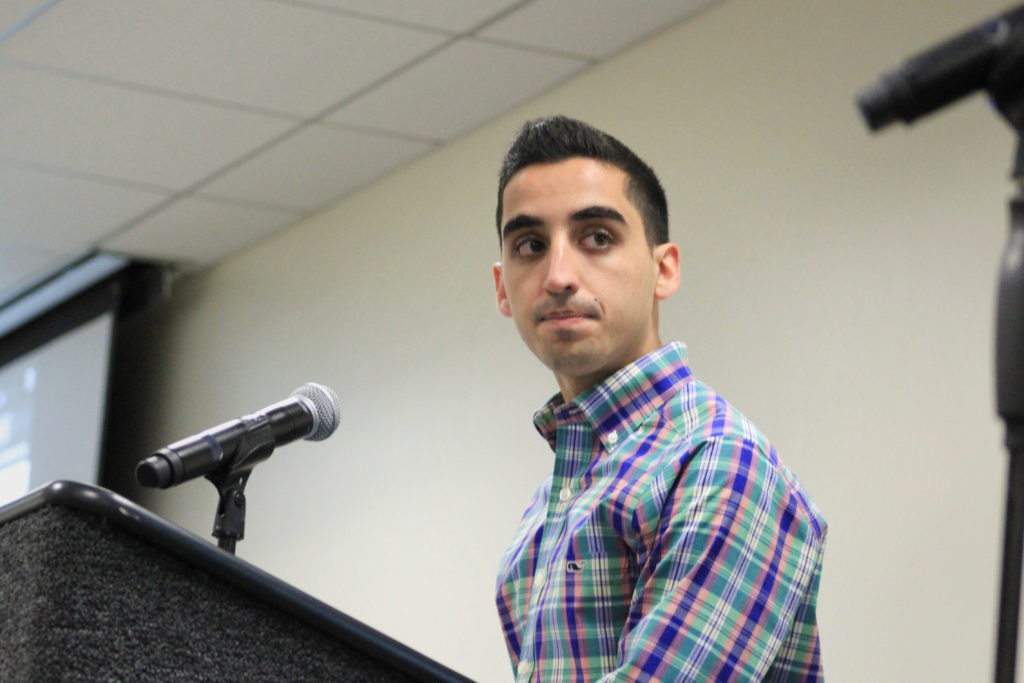The Student Association Senate is passing fewer but more thorough bills.
There have been seven senate resignations this year, but student leaders have refined procedures, leading to 12 bills passed so far this year and no suspensions of senators for not attending meetings. In past years, the SA faced organizational issues among members who were not well-prepared for senate meetings, had low attendance or resigned.
Senators are really working hard so any legislation proposed is well-researched.
SA Executive Vice President Thomas Falcigno said while the SA did pass 15 more bills in 2016 than the senate has by this time this year, many of last year’s were bylaw amendments that alter internal procedures for the senate. It is likely that the senate will pass about 10 more bills before the end of this semester, Falcigno said.
“In previous senates, there was a lot more legislation being proposed that was just fluff in the sense that nobody did any work on it and they were just proposing it, in my opinion, to have their name on a bill,” Falcigno said. “I don’t think that’s happening this year. Senators are really working hard so any legislation proposed is well-researched.”
Legislation passed this session include resolutions to increase accessibility of educational materials to the hearing and visually impaired, in support of adding a first year forgiveness policy to next year’s academic bulletin and mandating each senate committee to create affordability reports.
So far, only one bill has failed in the senate, which was a bylaw change on the procedure of how to fill vacant senate seats. Falcigno said few proposed pieces of legislation are met with opposition.
“It’s January so we still have a lot more meetings left,” Falcigno said. “I just care that the bills are good bills. If we have 12 good bills versus 20 OK bills, I would rather take the 12 good ones.”
Deadlines for bill proposals have been eliminated to solve the problem of rushed, unfinished legislation, which leads to longer debate and hostility on the floor, Falcigno said. Once Falcigno offers feedback to the bill’s author and sponsor, the bills are added to a Google Drive folder where all senators can read them before voting at a meeting.
“I’ve been very happy with the way the senate has run and I think that this senate in comparison to others I have been in – this is my fourth – has been the most efficient,” Falcigno said. “That was one of my goals coming in and I think that is something we will continue to see throughout the semester.”
Debates at senate meetings this year have been relatively brief, compared to past meetings that regularly lasted from 9 p.m. until midnight, because senators can ask questions before the meeting, Falcigno said. He added that if he favors a bill, he will go to committee meetings and answer any questions about it before a full senate meeting.
As for past issues with new senators, like hostility over bills and drawn-out debates, Falcigno said he shared all senators on a Powerpoint presentation explaining the meeting guidelines, and he has encouraged people who are considering applying for open senate seats to come to meetings to see how they are run.
“I actually have sat down with new senators to go over the rules,” Falcigno said. “When there are meetings where there are new senators, I do my best to go as slowly as possible so that they understand the motions. I think that has helped a lot.”
I warned the senators at the senate elect meeting in April that I would continue to enforce the rules if I saw that attendance was a problem.
When he took on the role of executive vice president in March, Falcigno suspended seven senators who consistently did not attend meetings. No senators have been suspended this session, he said.
Most resignations have been from graduate students who realize they have taken on too many duties, which is why Falcigno said he has been clear about senators’ expectations.
“I warned the senators at the senate-elect meeting in April that I would continue to enforce the rules if I saw that attendance was a problem,” Falcigno said. “But it hasn’t been, so that’s been good.”
SA President Erika Feinman said they encourage SA members who are not fully committed to withdraw from their positions.
“I think that’s something that we mutually prefer as opposed to someone who doesn’t show up or put the work in,” Feinman said. “If you can’t do the work, if you’re not enjoying it, resigning is something we would be in favor of.”
Dani Grace contributed to reporting.





